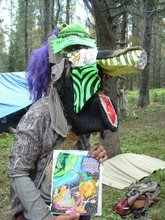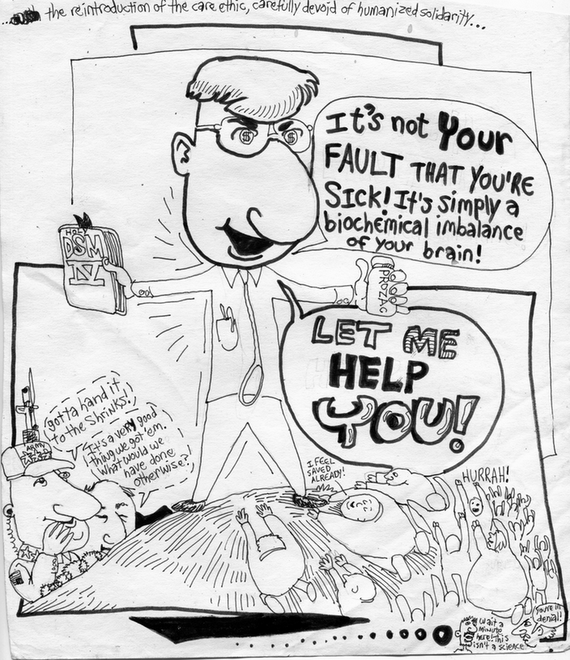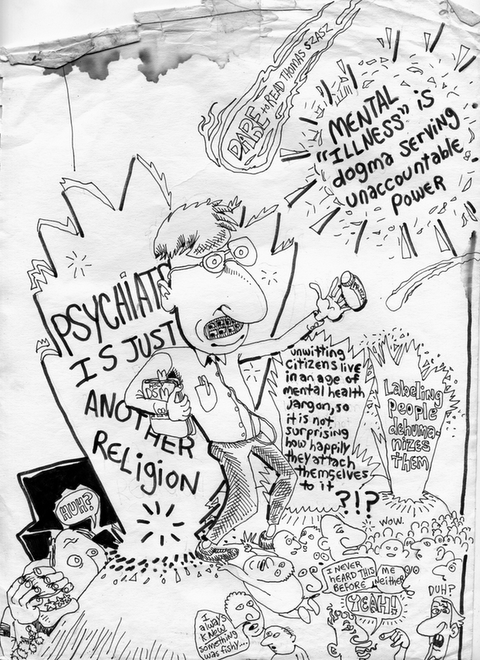=============
'artists are the antennae...' --Ezra Pound
==============
(re-edited for clarity, January 2008)
The following were posted in a forum promoting the artists' workbook entitled "The Artist's Way" by Julie Cameron. i've edited it in a way to make it more readable for those who weren't on the forum.
For those of you unfamiliar with this book, it became *very popular* quite suddenly a few years ago amongst many creatives in the business art "community" (or lack thereof), and was touted as especially allegedly "helpful" for those whom have, for some supposedly "unknown" reason, found themselves experiencing the phenomenon called "artists' block" and related challenges to making more money and living the materialist life we've all been socialized to think is just dandy and even "responsible".
One might assume that this isn't *such a big deal* until you begin to understand that the naive artists whose attention is hooked by this book are *also* being hyped-up to separate themselves from fellow artists whom are labled in destructive ways like "crazymaker".
Typical of "self help" books that get plugged in mainline society as being "exceptional" these days we see a certain pattern where:
A) Contexts for situations can never be more thoroughly explored much less found to lie within the institutions and their constructs that we're to uncritically subordinate to, but only in those who are having a hard time adequately assimilating (for reasons which escape most well-indoctrinated folks in our thought-control-oriented suiciety).
B) Rational explanations for why others, say "Crazymakers", do as they do are not to be adequately understood; they are to be labeled, reduced, and excluded!
My original reply to one of the happy promoters of the book:
My response to D, a happy promoter of the book on the forum mentioned above who posted various links to help sell it... She asked what my specific problem with the book was, and whether i had actually read it. Here's what i said:
D, i had a big problem with the way [Julie Cameron, the author] reduces and labels a group of artists who are exhibiting the *very real* (and crucial) symptoms of living a colonized (i.e. systematically alienated) life. (Yes, I'm saying that *all of 'society'* is a colonization attack on all whom are put through it in compulsory or otherwise duped ways, i.e. "the manufacture of consent").
Further, the author labels as "bad" (i.e. "crazymaker") the most potentially threatening group (to the social order) and seeks to further separate these very sensitive *social antennae* from those creative people who are even less in touch with their intuitive rebellion (from the "normalized" situations of artists working to enhance the social order).
Instead of promoting deeper thought about how some people can become "crazy" in the face of art cult-ure and all of its superficialities (which act as tho this is completely "normal") Cameron works to isolate these folks she has labeled and the reader with various cheap shots. Of course, by that time in the book, everyone reading "The Artist's Way" has already been bedazzled by the formula that *fills a void* (which virtually no one adequately demystifies) so they quite easily go along!
Thus a Bandwagon effect is put into action, and rebellion --especially that which is not yet even close to being articulate--is blocked from even coming to the veritable surface!
No wonder her book was allowed to shoot quickly up to the "Best Seller" list! No wonder all the commissars of the art industry LOVE this book! This is what propaganda is all about! This is classic thought control hoodwinking a majority (of often mediocre artists, hence their ability to fit into the business at all) while scapegoating a minority!
Consider Noam Chomsky's remarks in the preface of his book _Necessary Illusions: Thought Control in Democratic Societies_ (http://www.zmag.org/chomsky/ni/ni-preface.html ):
"A large part of this task is assumed by ideological institutions that channel thought and attitudes within acceptable bounds, deflecting any potential challenge to established privilege and authority before it can take form and gather strength. The enterprise has many facets and agents."
And only adding to divisions and alienation! Same old story!
Of course, such labeling and discrediting wouldn't have happened in communities, say, where intense folks are interpreted as *Gift givers* (i.e. shamans). Communities not fully "developed" like in Africa or other Native/indignous communities world-wide. Hadn't the Western Civilization art ghetto been already so deeply corralled (i.e. sensitives not being given any frame of reference to articulate their dissent from a profit-oriented, consumer art society, thus drinking away their pain), this wouldn't have so easily slipped past! (There may be challenges in the margins, but no "Art Magazine" "worth their salt" would publish serious dialogue amongst artists! No!)
And so thought control continues hardly challenged. And dissidents told to "get therapy" or be labled with these increasingly hostile reductions (let's not forget "Oppositional Defiant Disorder", now reportedly being used on adults as well as kids).
Every institution --including "the art world"-- which wants to continue having "a seat at the table" of *privileges* has to play this meta game. And it's no biggie scapegoating those minorities whom can't fight back. That's "normal" in thought control societies like ours.
i'm a working artist as well, yet my face has been repeatedly slapped with reality to a point where i was "lucky" to begin stumbling upon various subjects around institutional analyses which have similar patterns between them. Not a far stretch, then, to apply such to the art "community", especially when one sees the very real politics happening!
~~~~~~~~~~~~~~~~~~~~~~~~~~~~ "As domains of experience become more alien to us, we need greater and greater openmindedness even to conceive of their existence."--R.D. Laing in _The Politics of Experience_ from: http://evans-experientialism.freewebspace
Subscribe to:
Post Comments (Atom)



No comments:
Post a Comment